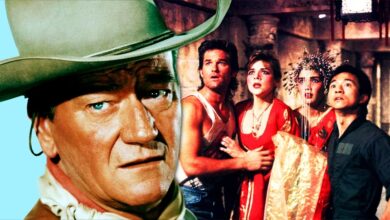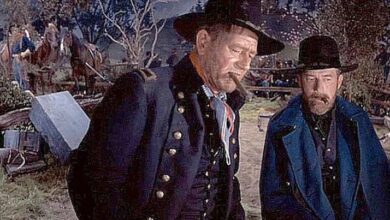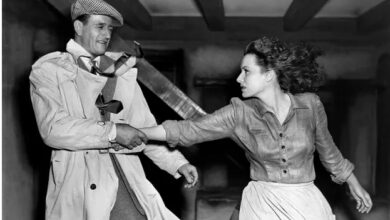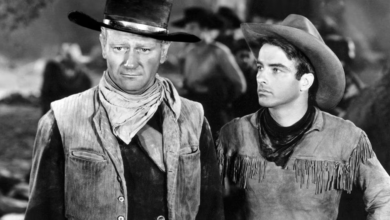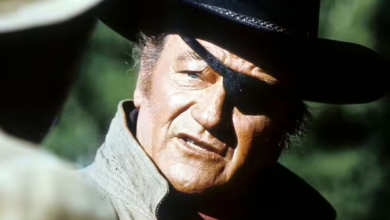Unsurprisingly, John Wayne Hated The Way The Movie Industry Was Heading

In 1949, John Wayne was nominated for the Academy Award for Best Actor for his performance in Allan Dwan’s war film “Sands of Iwo Jima.” Despite several thoughtful antiwar films that preceded it — specifically “All Quiet on the Western Front” and “The Best Years of Our Lives” — “Iwo Jima” came at a time when patriotic, downright jingoistic movies about World War II were coming into vogue. In particular, 1949 saw the release of films like “Battleground” and “Twelve O’Clock High,” both films about the nobility of war and the heroism of soldiers. Both those films were nominated for Best Picture, although they lost to the political corruption drama “All the King’s Men.” Wayne himself lost Best Actor to Broderick Crawford, the star of “King’s Men.”
In 1969, Wayne looked back on “Iwo Jima” in an interview with Roger Ebert, and posited that he lost his Oscar for political reasons. A lot had changed in Hollywood from 1949 to 1969, and a new, exciting type of grounded, emotional cinema was coming into view. The French New Wave was in full swing, and a new generation of filmmakers, the first to be professionally trained in film school, was starting to appear on the horizon. 1969 was, to recall, the year of “Easy Rider.” Nostalgia about cowboys and soldiers was on the wane.
There was, however, enough nostalgia to net Wayne another Oscar nomination for his appearance in “True Grit,” an award he would ultimately win, beating out both Dustin Hoffman and Jon Voight for “Midnight Cowboy.” Prior to his win, he spoke with Ebert about the increasingly left-leaning nature of Hollywood. It seems that, even from the start, pundits were complaining about being “canceled” and that Hollywood was getting “too political.”
Political art
Paramount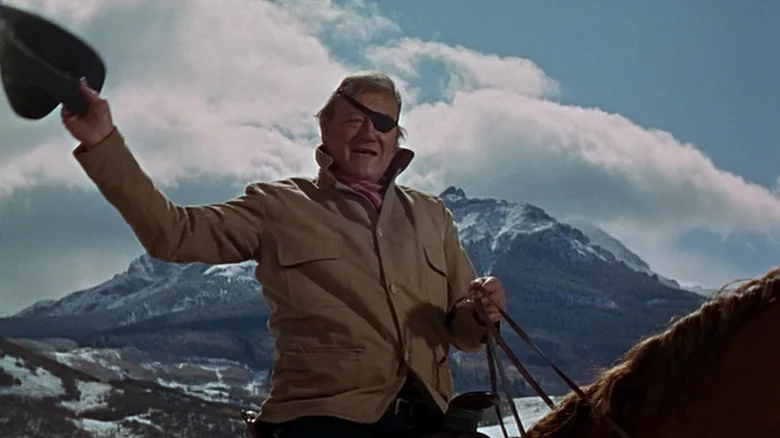
As many critics will be eager to point out, all art is political. Every piece of art is going to necessarily reflect the time and the overarching politic of when it was made, always communicating a message that an artist may or may not even be aware of. If a film seemingly has “no politics” or is “just entertainment,” it is promoting the politic of the status quo, arguing that a lack of change is what is currently needed. Which is, of course, a political statement.
Wayne, however, had no appreciation for such nuances, feeling that politics got in the way of cinema far too often. To Ebert, on the event of his “True Grit” win, he said:
“I was nominated for ‘Sands of Iwo Jima’ but I didn’t win. Well, maybe this time they’ll review the picture instead of me and the war. That little clique back there in the East has taken great personal satisfaction in reviewing my politics instead of my pictures. And they’ve drawn up a caricature of me. Which doesn’t bother me; their opinions don’t matter to the people who go to movies.”
The “clique from the East” Wayne refers to may be a reference to New York critics who were seemingly keen on analysis and sociology. Wayne was also grossed out by some outcry over the new MPAA ratings system that was, in 1968, being pioneered to replace the moribund Hays Code. He said:
“I’m telling you, goddam it, everything’s mixed up now. I got a letter from that fellow who runs the Motion Picture Association. Jack Valenti. He wanted my opinion on the new rating system. I didn’t even answer because — well, my answer would be there shouldn’t be any need for such a thing in our industry.”
The good old days
Paramount
Wayne, without mentioning the Hays Code, pointed out that Hollywood was always good about making movies that appealed to families, implying that sex and violence were usually relegated to fringe productions. He felt that a rating system only stood to make parents afraid of taking their kids to see movies, and would ultimately make cinemas a less habitual past time. Concern about content was, to the actor’s eyes, anathema to cinematic enjoyment.
He then began to look back to a time in the industry — Hollywood’s Golden Age — prior to the enacting of the Paramount Consent Decrees in 1948. Before 1948, studios were permitted to own their own theaters, leading to complete control over every aspect of production. Thanks to the system in place, smaller studios had trouble finding screens and theaters were beholden to studio contracts. In 2020, the decrees were officially overturned.
Wayne recalled when powerful producers and studios ran everything, and felt that it served him just fine. He said:
“All the real motion picture people have always made family pictures. But the downbeats and the so-called intelligentsia got in when the government stupidly split up the production companies and the theaters. The old giants — Mayer, Thalberg, even Harry Cohn, despite the fact that personally I couldn’t stand him — were good for this industry. Now the goddamned stock manipulators have taken over.”
A lack of studio control and an unbinding of family-friendly content irk Wayne further. He grumpily intoned:
“They don’t know a goddamned thing about making movies. They make something dirty, and it makes money, and they say, ‘Jesus, let’s make one a little dirtier, maybe it’ll make more money.’ And now even the bankers are getting their noses into it.”
Star!
20th Century Fox
Wayne didn’t mention “Midnight Cowboy” in his complaints about “dirty” movies. It’s notable, however, that “Midnight Cowboy” was the first X-Rated film to win Best Picture. Audiences were in the mood for more adult fare, it seemed, and Wayne saw the production of stories about sex and sexuality to be the mere capitulation of studios to a sex-starved audience. He does mention the notorious box office bomb “Star!” the Gertrude Lawrence biopic starring Julie Andrews. Wayne’s specific gripes with “Star!” go unsaid, but he objected to Andrews playing the part. He said:
“I’ll give you an example. Take that girl, Julie Andrews, a refreshing, openhearted girl, a wonderful performer. Her stint was ‘Mary Poppins’ and ‘The Sound of Music.’ But she wanted to be a Theda Bara. And they went along with her, and the picture fell on its face. A Goldwyn would have told her, ‘Look, dear, you can’t change your sweet and lovely image…'”
Of course, what Wayne fails to acknowledge is that the world was changing as was Hollywood. Thanks to the stripping away of the strict, anti-sex purview of the Hays code, complex adult stories could now make their way to theaters. Previously taboo subjects could be seen on the screen. Wayne preferred the Good Old Days of restriction and the glorification of … well, of characters like John Wayne.
Wayne, of course, wasn’t known for his gentleness, open-mindedness, or racial sensitivity (he allegedly tried to attack Sacheen Littlefeather at the 1973 Oscars). In a 1971 interview with Playboy, he admitted to being openly racist, homophobic, and a white supremacist. He longed for a racist world that society was endeavoring to leave behind. That he felt left behind reflects more on him than on Hollywood.

